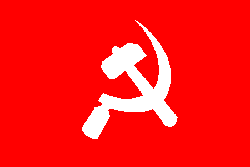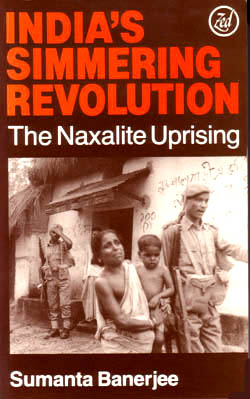|

|
From Wikipedia - The
Communist Party of India (Maoist) is an
underground Maoist political party in India.
It was founded on September 21,
2004, through the merger of the
Communist Party of India (Marxist-Leninist)
People's War and the Maoist Communist Centre
of India. The merger was announced to the
public on October 14 the same
year. In the merger a provisional central
committee was constituted, with PW leader
Ganapati as General Secretary. The CPI
(Maoist) are often referred to as Naxalites
in reference to the Naxalbari insurrection by
radical Maoists in West Bengal in 1967. The
Centre on 22nd June 2009 (Monday) banned the
CPI (Maoist) under the Unlawful Activities
(Prevention) Act, calling it a terrorist
organization.Following the ban ,the Maoists
will now be liable for arrested under the
UAPA.They are barred from holding
rallis,public meetings and demonstrations,
and their offices if any,will be sealed and
bank account frozen.Earliar ,the union home
minister,Mr P.Chidambaram had asked the West
Bengal Chief Minister ,Mr Buddhadeb
Bhattacharjee, to ban the the Maoists
following the Lalgarh Violence. "
|
|
|
International Relations
in THE AGE OF EMPIRE
India Bans Communist Party of
India-Maoist (CPI-M)
BBC 22 June 2009
[see also
 'It�s outright war and both
sides are choosing their weapons'
- Arundhati Roy in
conversation with Shoma Chaudhury,Tehelka, March
2007 "... to equate a resistance movement
fighting against enormous injustice with the
government which enforces that injustice is
absurd. The government has slammed the door in
the face of every attempt at non-violent
resistance. When people take to arms, there is
going to be all kinds of violence
� revolutionary, lumpen and
outright criminal. The government is responsible
for the monstrous situations it creates...does
this mean that people whose dignity is being
assaulted should give up the fight because they
can�t find saints to lead them
into battle?. " and
'It�s outright war and both
sides are choosing their weapons'
- Arundhati Roy in
conversation with Shoma Chaudhury,Tehelka, March
2007 "... to equate a resistance movement
fighting against enormous injustice with the
government which enforces that injustice is
absurd. The government has slammed the door in
the face of every attempt at non-violent
resistance. When people take to arms, there is
going to be all kinds of violence
� revolutionary, lumpen and
outright criminal. The government is responsible
for the monstrous situations it creates...does
this mean that people whose dignity is being
assaulted should give up the fight because they
can�t find saints to lead them
into battle?. " and
  25 years ago -
India's Simmering
Revolution: The Naxalite Uprising 25 years ago -
India's Simmering
Revolution: The Naxalite Uprising![]() - Sumanta
Banerjee
"...The term `Naxalite' (from
Naxalbari) has continued to symbolize any
assault on the assumptions and institutions
that support the established order in India. It
has become a part of the common speech all over
India, and along with 'Huk' of Philippines, 'Al
Fatah' of Palestine and `Tupamaros' of Uruguay,
has today found a place in the vocabulary of
world revolution... Obituarists of the movement have always
proved to be premature in their
pronouncements. If the movement was
contained and declared "crushed" in one part of
India it soon erupted in another, sometimes a
very unexpected corner of the country.
Naxalbari was followed by Srikakulam:
Srikakulam by Debra-Gopiballavpur; Debra-Gopiballavpur by
Birbhum; Birbhum by Bhojpur
�where still today, peasant
guerrillas of the CPI (M-L) continue to fight
back against a repressive feudal
regime... The ideologue
of the movement � fiery-eyed,
frail Charu Mazumdar, who was a victim of
cardiac asthma and was driven to death by
police persecution � was fond
of saying: "No word
ever dies... Our words
remain embedded among the
people... One who doesn't dream and can't make
others dream, can never become a
revolutionary." - Sumanta
Banerjee
"...The term `Naxalite' (from
Naxalbari) has continued to symbolize any
assault on the assumptions and institutions
that support the established order in India. It
has become a part of the common speech all over
India, and along with 'Huk' of Philippines, 'Al
Fatah' of Palestine and `Tupamaros' of Uruguay,
has today found a place in the vocabulary of
world revolution... Obituarists of the movement have always
proved to be premature in their
pronouncements. If the movement was
contained and declared "crushed" in one part of
India it soon erupted in another, sometimes a
very unexpected corner of the country.
Naxalbari was followed by Srikakulam:
Srikakulam by Debra-Gopiballavpur; Debra-Gopiballavpur by
Birbhum; Birbhum by Bhojpur
�where still today, peasant
guerrillas of the CPI (M-L) continue to fight
back against a repressive feudal
regime... The ideologue
of the movement � fiery-eyed,
frail Charu Mazumdar, who was a victim of
cardiac asthma and was driven to death by
police persecution � was fond
of saying: "No word
ever dies... Our words
remain embedded among the
people... One who doesn't dream and can't make
others dream, can never become a
revolutionary."
The Indian government has banned
the Maoist Communist Party of India as a terrorist
group, giving security forces enhanced powers of
arrest. The move provides Indian police with the
power to detain members of the party even if they
have not been involved in insurgent activity.
Earlier, five states across east and central India
were put on a high alert as the Maoists called a
two-day strike. One district in West Bengal briefly
fell under almost total Maoist control. The rebels
said the strike they declared was in response to
the "war" on people in Lalgarh, West Bengal, where
security forces launched an offensive in recent
days. Lalgarh had been under the virtual control of
the rebels since November.
But police and paramilitary troops have been
attempting to consolidate their grip on the jungle
enclave over which they re-established control over
the weekend.
Monday's strike began a day after 11 police died in
a rebel attack in Chhattisgarh state and two days
after 16 policemen were killed in landmine blasts
triggered by the Maoists in the same state.
Issuing a high alert for the five states in which
the strike was declared, the interior ministry said
India's federal Intelligence Bureau had "specific
inputs" that Maoists were planning possible
attacks.
"Security forces, as well as economic
infrastructure like railways, buses and crowded
markets, may be targeted by the Maoists to make
their presence felt during the strike," the
interior ministry advisory said.
India's prime minister, Manmohan Singh, has
described the Maoists as the greatest threat to
India's internal security.
The ban on the Communist Party of India (Maoist) or
CPI-M comes just a month after the Congress party
won a decisive victory in elections - leaving it
with no need to turn to communist parties for
support in shoring up a coalition.
Correspondents say it is unclear how big an impact
the ban will have in the fight against the
rebels.
Lalgarh unrest
Villagers in Lalgarh say their young men are being
forced by police to hunt for explosives planted by
the Maoists.
"They are giving the village boys an S-shaped iron
rod each, asking them to hook it to wires sticking
out anywhere and pull it. This is dangerous because
they will be too close to the explosives if the
wires are linked to them," said Chattradhar Mahato,
chairman of the Peoples Committee on Police
Atrocities (PCPA), active in the Lalgarh area.
Some of Bengal's leading artists, including
film-maker Aparna Sen, visited Lalgarh on Sunday in
a attempt to broker peace between the West Bengal
government and the Maoists.
But neither appeared to be in a mood to talk.
"The Maoists have no specific demand, they are just
out to create trouble. We have to continue the
operations to deal with them," said Bengal's chief
secretary Ashok Mohan Chakrabarty.
Maoist leader Kishneji told the BBC: "We will show
the government what is people's power. No police or
army can crush that."
Thousands of villagers have fled their homes in the
Lalgarh region to avoid getting caught in the
fighting, heading towards neighbouring areas of
Bankura district.
The Bengal government started the offensive to
retake Lalgarh, which had effectively been under
Maoist control since November.
The Maoists skilfully harnessed people's anger over
police excesses following an Maoist attempt to kill
chief minister Buddha Bhattacharya through a
landmine blast, says the BBC's Subir Bhaumik in
Calcutta.
Maoist-linked violence has killed 6,000 people in
India over two decades.
|
|